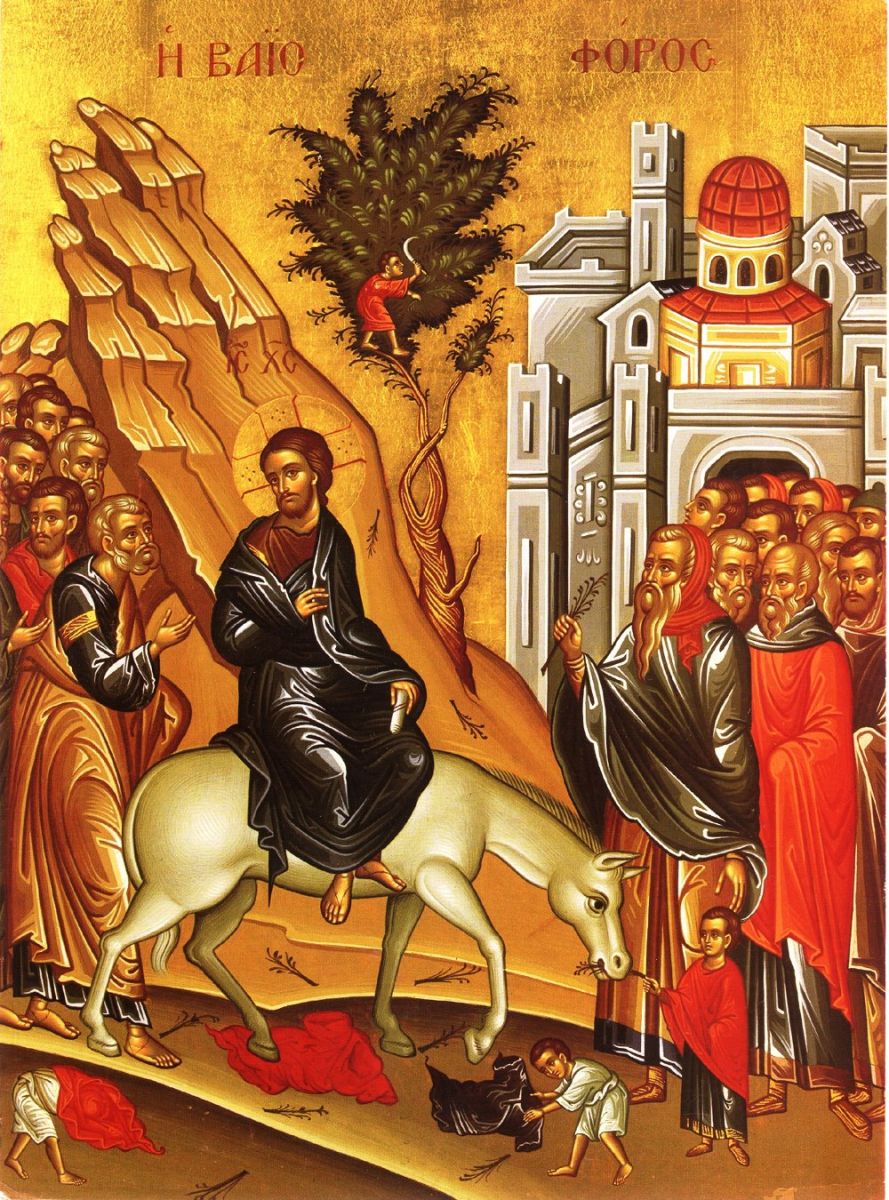- Home
- About us
- Students
- Courses
- Research
- Library
- News & Events
- Gallery
- Contact
- Our Blog
Latest News

The Feast Day of Palm Sunday:
the Revelation of God's Heavenly Kingdom within the World

by Assoc. Professor Philip Kariatlis (Sub-Dean)
“Come out, O nations! Come out, O peoples! Behold the King of the heavens on this day,
as on a lofty throne, yet on a lowly colt, riding into Jerusalem…”
“Ἐξέλθετε ἔθνη, ἐξέλθετε καὶ λαοί, καὶ θεάσασθε σήμερον, τὸν Βασιλέα τῶν οὐρανῶν,
ὡς ἐπὶ θρόνου ὑψηλοῦ, ἐπὶ πώλου εὐτελοῦς, τὴν Ἱερουσαλὴμ προσεπιβαίνοντα…”
On the feast day of Palm Sunday, the Church celebrates the triumphal entry of our Lord Jesus Christ into the city of Jerusalem seated on a colt of a donkey before his impending Passion, death and resurrection. It is a feast day replete with paradox, majesty and profound spiritual meaning. As indicated by the assigned Gospel reading for the day (Jn 12:1-18), it is a festal event which Jesus himself instigated both in fulfilment of the Old Testament prophecy of Zechariah—“Do not be afraid, daughter of Sion: look your king is coming, sitting on a donkey’s colt” (Zech 9:9)—but also so as to offer himself freely as the Passover lamb, as “a ransom for all” (1Tim 2:6) inviting us, in this way, into the all-embracing and endless love of the Trinitarian mystery. Specifically, the entrance of our Lord into the holy city of Jerusalem on a young donkey—where He would be met by throngs of people with great enthusiasm and excitement, laying branches of palm trees on the road and recognised as king—pays tribute to the fact that Christ’s kingship is now no longer a future reality but is, in actuality, within our midst. In ushering God’s eternal kingdom within the world, Jesus Christ summons all people into His Father’s kingdom to experience the resplendent joy, the everlasting delight and the liberating spaciousness of “life in all abundance” (cf. Jn 10:10), namely, the gift of life without end!
It is of paramount importance to understand that, gathered together on this day as the Church of Jesus Christ, by the grace of the Holy Spirit, we are mystically made present at this joyous event, so that we too may go out to meet Him with palm leaves and branches. That is, the festal commemoration of Palm Sunday by the Church is not simply a two-thousand-year-old historical event that we are simply asked to call to mind. Rather, and most profoundly, Palm Sunday takes place today. The Lord comes to us, as King, in our present context, namely, into our Jerusalem, meek yet almighty, offering Himself to each one of us in a most intimate and personal manner. Opening our hearts, therefore, in response to this majestically resplendent Presence, we too are enabled to cry out—as in fact we will do through one of the hymns of the Church that is chanted on this day: “Today Christ is entering the Holy City… [Σήμερον ὁ Χριστός, εἰσέρχεται ἐν πόλει τῇ ἁγίᾳ]” … Blessed are You, the One, who is coming in the name of the Lord. Hosanna in the Highest[Εὐλογημένος ὁ ἐρχόμενος, ἐν ὀνόματι Κυρίου, Ὡσαννὰ ἐν τοῖς ὑψίστοις.]!”[1] The word, ‘Hosanna’ originally meant ‘save us’; and so, we too confess and proclaim the coming of Jesus as our true King who will usher in the gift of salvation upon all. It is precisely for this reason that Palm Sunday marks a moment of celebration. In going out to greet Him, we too are enabled to receive Him into our lives as King and Saviour of the world. Indeed, finding ourselves at the end of Holy and Great Lent, and at the cusp of all the harrowing events that Jesus will come to suffer during Holy Week, we too are graciously given a genuine foretaste in the here and now of the radiant joy of the Resurrection that will culminate on Pascha, bringing with it the unfathomable gift of eternal life upon the entire world.
With the unveiling of His kingdom through this royal and solemn entrance, the Church invites us on this day, not only to acknowledge Christ’s sovereignty, but also to allow His reign to take root deep within our hearts—manifesting itself in our witness of love, our compassion for others, and our hope of being raised with Him on the glorious day of His Resurrection. Upon further reflection, we see that Christ’s entry into the Holy City was not marked by earthly splendour or military might. On the contrary, He entered “meek and sitting on a donkey” (Mt 21:5). In this way, that which is revealed before us is the majestic glory of divine humility and redemptive suffering. It is only in being buried with our Lord that we will experience not only the joy of His Resurrection but also the hope—and, indeed, eagerly so—of the victory of life granted to all the world, and, by implication, the destruction and dissolution of death. In one of the hymns of the day we sing: “We were buried with You through Baptism, O Christ our God, and thus by your Resurrection we have been granted immortal life [Συνταφέντες σοι διὰτοῦΒαπτίσματος, ΧριστὲὁΘεὸς ἡμῶν, τῆς ἀθανάτου ζωῆς ἠξιώθημεν τῇἈναστάσει σου].” The great paradox is that the divine gift of eternity is bestowed upon the world through Christ’s death on the Cross. During Holy Week, Christ is portrayed as the Bridegroom—and we must not forget that in the sacred imagery of Scripture, the Bridegroom signifies splendour, majesty, and divine glory. In this way, the Church teaches that the glory and majesty are fully revealed not despite the Cross, but on the Cross—for it is there that Christ “caused death to die and raised up the world.” Accordingly, we, too, following Christ, need to die to our old corruptible self in order to clothe ourselves with the eternity of Christ’s life.
Christ offers a new kind of eternal kingship not built on force, but on self-giving love. Today, Christ as King stands amongst us, and approaches us, not with power, but with sacrificial love; not as a judge, but as our Savior; He condescends and speaks to us in human terms full of infinite sympathy and solicitude. He invites us to lay down not just branches, but our hearts to Him; to welcome Him not with fleeting emotions, but with genuine repentance and faith; to confess, as we did on the day of our Baptism, that His kingdom is our own and only lasting reality. Our journey towards Christ’s eternal kingdom—in response to Christ’s sovereignty—begins today, as we follow Him into Jerusalem, and ultimately to Golgotha. So many today cry out for peace, healing and justice, but the only true peace, the only lasting healing—one, victorious of death itself—comes through Christ our King, and his Cross. Therefore, with spirits rekindled, reminded once again that it is only through the Cross of Christ our King that joy has come into the world, let us walk with Him through Holy Week—not as spectators, but as participants. Let us weep with Him, suffer with Him, die with Him—so that we may also rise with Him. Indeed, let us endure all things—our manifold sufferings, our multiple hardships, and inevitable array of multifarious adversities—patiently, and joyously, for we know the Lord is at hand, ready to bestow upon us so graciously, the one thing needful, and indeed lasting—that is, the gift of victory over death! It remains for us to open our hearts and, with ardent desire, to invite Him to enter therein; to emulate His sacrificial love towards those around us. In so doing, our entire being will have attracted and indeed will have been permeated with the Grace and joy of the unfading light of the Resurrection and Eternity.
[1]Hymn of the Orthros Service sung immediately after the Gospel and the reading of the 50th Psalm.



.png)